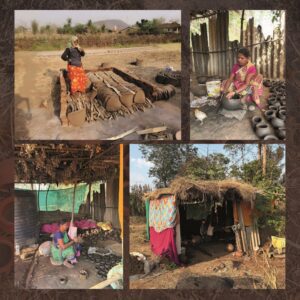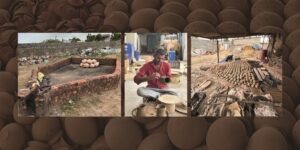Presentation by curators Rajesh Kulkarni and Raju Sutar | 16th February 24’
‘Lost and Found’ is a collaborative project under Creative Dignity’s ‘CraftxClimate’ initiative with curators Rajesh Kulkarni and Raju Sutar to position crafts as a model to mitigate climate crisis. Focused on two pottery production regions of Warak (Maharashtra) and Kutch (Gujarat), they have collaborated with indigenous communities to systematically and scientifically study the clay compositions to cope with the evolving environmental conditions and potential of the local economy.
The presentation brought out multiple facets of the impact of climate change on indigenous pottery communities in India, the challenges and opportunities within these respective clusters, with a focus on supporting local potters and preserving traditional pottery practices as well as the importance of positioning the learnings of this initiative in different biomes.
A visual capsule of ‘Lost and Found’ is also exhibited at the Indian Ceramic Triennale, Delhi.
Below are key takeaways:
United by Calamity and Craft
A history of natural calamities i.e. Nisarga Cyclone in Warak and earthquake in Kutch and attitude of community resilience in its wake unites these two regions, which are geographically miles apart. The artists also during their research found historical connections between Warak and Kutch. The historical evidence of Kutch pottery is found in Kelashi, a coastal port in Warak region, dating 2000 years back.
Warak, a small village situated in Indapur, near Konkan region has small but resilient pottery community mainly led by women. Rajesh, who lives in Indapur, shared that though pottery is a generational craft for communities, migration by local population, especially men due to urbanisation over years has led to shrinkage of this craft practice.


Catastrophe and Material Innovation
The Nisarga Cyclone of 2020, a rare and sporadic phenomenon in the region, resulted in significant material loss. However, the aftermath of the cyclone brought about a resurgence in Warak pottery, with a surge in demand for corner roof ridge tiles (dhapas).
During numerous site visits, Rajesh and Raju observed compromised firing techniques and inadequate material mixes within the community, leading to increased breakage during the firing process. “60 percent of efforts go into drying and firing the product. Breakage due to poor soil mix and technical firing limitations results in financial loss,” shared Rajesh.
Intervention by Creative Dignity shed light on the environmental and urbanization challenges affecting not only Warak but also other pottery clusters across the country. Under the guidance of Anand Damle, CEO of Damle Clay Structurals, a comprehensive documentation and analysis of soil mixes, including experiments such as soil particle analysis and plasticity index, were conducted in Warak, Kutch, Tuna, and Fatehgarh. The study acknowledged the diverse geological soil compositions of the Indian peninsula, ranging from the Indo-Gangetic plains to arid clay in Western India, laterite soil in the Western Ghats, and the Deccan’s black cotton soil. Rajesh and Raju affirmed that clay composition, cultural influences, and skill levels determine the nature of products produced in each region.


Collaboration to Community Adoption
Kiln and Firing Solutions:
Through their research, the duo approached Khamir, a platform for the crafts, heritage and cultural ecology in Kutch to learn about energy efficient kilns developed by RuTAG (Rural Technology Action Group) IIT Delhi and its community adaptation. Through a prototype kiln in Warak designed through Khamir’s assistance, the breakage has reduced, a validation to the process.
Ghatit Laheru from Khamir shed light on the successful adoption of energy-efficient kilns by the potter community in Kutch. The simplicity and effectiveness of the kilns’ design played a significant role in their widespread acceptance. Initially introduced with just one or two kilns in each village, the number has now grown to over 14 operational kilns. This transition has led to a remarkable reduction in fuel dependency, by up to 40 percent. Laheru further emphasized the importance of the younger generation taking up responsibility for these clusters, ensuring their continued success and sustainability.
Gender Stewardship:
Within the community of Warak, a unique dynamic has emerged where a mother- and daughter-in-law duo have become revered local authorities in the intricate art of kiln firing. Their expertise has been sought for community development. In the wake of significant male migration to urban centers like Mumbai and Pune, the responsibility of pottery production has fallen upon the capable shoulders of the women within the households of Warak. Balancing the demands of farming, household chores, and the craft of pottery, these women exemplify resilience and adaptability. Their unwavering commitment to managing both domestic responsibilities and the consistent production of ridge roof tiles not only sustains the craft ecosystem but also fosters stability within the community.
Low-Tech Solutions:
The curators shared that adoption will become a reality when solutions offered are low-tech and easy to adapt. For example, Ranju Bhai in Kutch, who production line is consistent, only needs shelter assistance to store his wares. Another example is training initiative with women of Warak, which will be a success if it is designed as per their schedule.
Circular Economy and Sustainable Architecture:
Discussions also emphasized the necessity of situating this initiative within various biomes. The imperative for sustainable architecture underscores the need for utilizing local terracotta materials as filler, thereby reducing reliance on cement. Emphasizing the preservation of a circular economy, minimizing carbon footprint, and recognizing the pivotal role of their efforts in the architectural sector were highlighted as essential. Presently, Warak exclusively caters to the local market. However, expanding to broader markets may necessitate mechanization and economies of scale, potentially placing ecological strain—a dimension the project team acknowledges and aims to navigate with utmost sensitivity.
Way Forward:
Rajesh noted children’s interest in learning the craft and its positive impact on preserving the generational cultural heritage. Meera of Creative Dignity suggested sharing Rajesh’s pottery curriculum with other potters and clusters like Satara and Kolhapur. Pottery as a sustainable livelihood practice and its adoption as a green material which is an example of circular design application will only be viable if it receives the right pricing and continued access to material.
Additional Reading
Changes in local climate impact Kachchh’s traditional crafts and craftspeople
CraftxClimate
Creative Dignity’s “CraftxClimate” initiative aims to position the crafts sector at the forefront of UN SDG 12 ‘Responsible Production and Consumption’ through issue identification, knowledge sharing, capacity building, and advocating sustainable solutions.